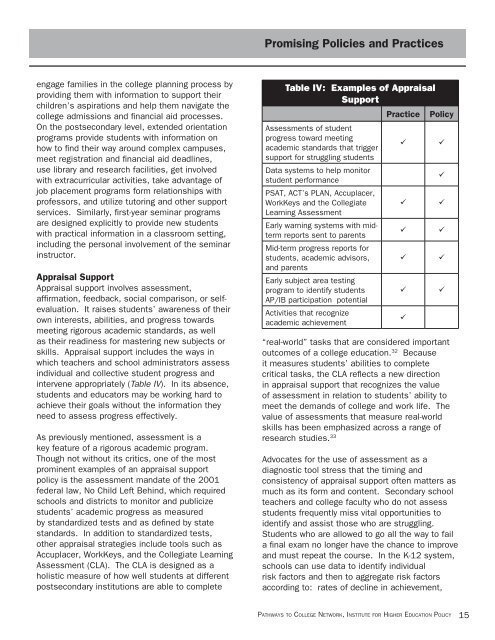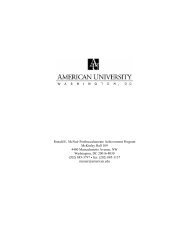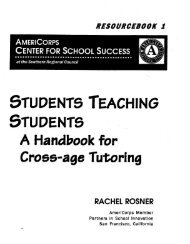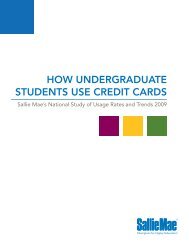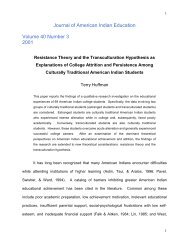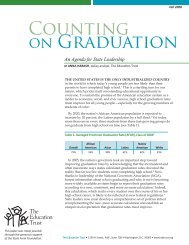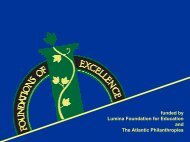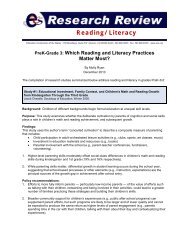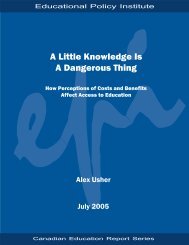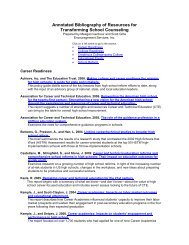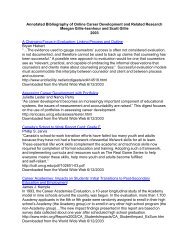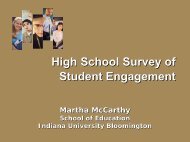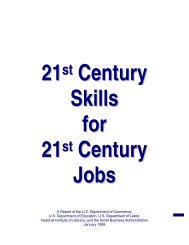Removing Roadblocks to Rigor: Linking Academic and Social ...
Removing Roadblocks to Rigor: Linking Academic and Social ...
Removing Roadblocks to Rigor: Linking Academic and Social ...
Create successful ePaper yourself
Turn your PDF publications into a flip-book with our unique Google optimized e-Paper software.
Promising Policies <strong>and</strong> Practices<br />
engage families in the college planning process by<br />
providing them with information <strong>to</strong> support their<br />
children’s aspirations <strong>and</strong> help them navigate the<br />
college admissions <strong>and</strong> financial aid processes.<br />
On the postsecondary level, extended orientation<br />
programs provide students with information on<br />
how <strong>to</strong> find their way around complex campuses,<br />
meet registration <strong>and</strong> financial aid deadlines,<br />
use library <strong>and</strong> research facilities, get involved<br />
with extracurricular activities, take advantage of<br />
job placement programs form relationships with<br />
professors, <strong>and</strong> utilize tu<strong>to</strong>ring <strong>and</strong> other support<br />
services. Similarly, first-year seminar programs<br />
are designed explicitly <strong>to</strong> provide new students<br />
with practical information in a classroom setting,<br />
including the personal involvement of the seminar<br />
instruc<strong>to</strong>r.<br />
Appraisal Support<br />
Appraisal support involves assessment,<br />
affirmation, feedback, social comparison, or selfevaluation.<br />
It raises students’ awareness of their<br />
own interests, abilities, <strong>and</strong> progress <strong>to</strong>wards<br />
meeting rigorous academic st<strong>and</strong>ards, as well<br />
as their readiness for mastering new subjects or<br />
skills. Appraisal support includes the ways in<br />
which teachers <strong>and</strong> school administra<strong>to</strong>rs assess<br />
individual <strong>and</strong> collective student progress <strong>and</strong><br />
intervene appropriately (Table IV). In its absence,<br />
students <strong>and</strong> educa<strong>to</strong>rs may be working hard <strong>to</strong><br />
achieve their goals without the information they<br />
need <strong>to</strong> assess progress effectively.<br />
As previously mentioned, assessment is a<br />
key feature of a rigorous academic program.<br />
Though not without its critics, one of the most<br />
prominent examples of an appraisal support<br />
policy is the assessment m<strong>and</strong>ate of the 2001<br />
federal law, No Child Left Behind, which required<br />
schools <strong>and</strong> districts <strong>to</strong> moni<strong>to</strong>r <strong>and</strong> publicize<br />
students’ academic progress as measured<br />
by st<strong>and</strong>ardized tests <strong>and</strong> as defined by state<br />
st<strong>and</strong>ards. In addition <strong>to</strong> st<strong>and</strong>ardized tests,<br />
other appraisal strategies include <strong>to</strong>ols such as<br />
Accuplacer, WorkKeys, <strong>and</strong> the Collegiate Learning<br />
Assessment (CLA). The CLA is designed as a<br />
holistic measure of how well students at different<br />
postsecondary institutions are able <strong>to</strong> complete<br />
Table IV: Examples of Appraisal<br />
Support<br />
Practice Policy<br />
Assessments of student<br />
progress <strong>to</strong>ward meeting<br />
academic st<strong>and</strong>ards that trigger<br />
¸ ¸<br />
support for struggling students<br />
Data systems <strong>to</strong> help moni<strong>to</strong>r<br />
student performance<br />
¸<br />
PSAT, ACT’s PLAN, Accuplacer,<br />
WorkKeys <strong>and</strong> the Collegiate ¸ ¸<br />
Learning Assessment<br />
Early warning systems with midterm<br />
reports sent <strong>to</strong> parents<br />
¸ ¸<br />
Mid-term progress reports for<br />
students, academic advisors, ¸ ¸<br />
<strong>and</strong> parents<br />
Early subject area testing<br />
program <strong>to</strong> identify students ¸ ¸<br />
AP/IB participation potential<br />
Activities that recognize<br />
academic achievement<br />
¸<br />
“real-world” tasks that are considered important<br />
outcomes of a college education. 32 Because<br />
it measures students’ abilities <strong>to</strong> complete<br />
critical tasks, the CLA reflects a new direction<br />
in appraisal support that recognizes the value<br />
of assessment in relation <strong>to</strong> students’ ability <strong>to</strong><br />
meet the dem<strong>and</strong>s of college <strong>and</strong> work life. The<br />
value of assessments that measure real-world<br />
skills has been emphasized across a range of<br />
research studies. 33<br />
Advocates for the use of assessment as a<br />
diagnostic <strong>to</strong>ol stress that the timing <strong>and</strong><br />
consistency of appraisal support often matters as<br />
much as its form <strong>and</strong> content. Secondary school<br />
teachers <strong>and</strong> college faculty who do not assess<br />
students frequently miss vital opportunities <strong>to</strong><br />
identify <strong>and</strong> assist those who are struggling.<br />
Students who are allowed <strong>to</strong> go all the way <strong>to</strong> fail<br />
a final exam no longer have the chance <strong>to</strong> improve<br />
<strong>and</strong> must repeat the course. In the K-12 system,<br />
schools can use data <strong>to</strong> identify individual<br />
risk fac<strong>to</strong>rs <strong>and</strong> then <strong>to</strong> aggregate risk fac<strong>to</strong>rs<br />
according <strong>to</strong>: rates of decline in achievement,<br />
PATHWAYS TO COLLEGE NETWORK, INSTITUTE FOR HIGHER EDUCATION POLICY<br />
15


